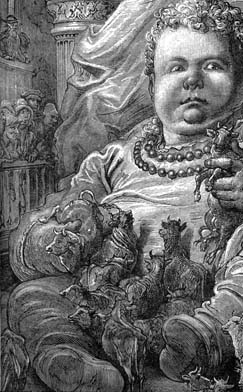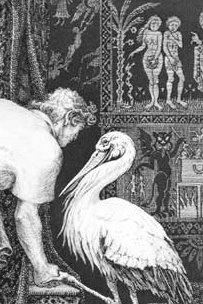I didn't sleep at all last night.
It sometimes happens. I get started reading or writing, and all of a sudden, I notice the clock and it's 3:15, and I'm still not tired. Sometimes I'll try to sleep, but lie awake until, finally it becomes clear that it's just not going to be a restful night. I'll get back up, get dressed and go back to writing or reading.
Last night was one of those nights.
I will be alone for a few hours. My wife is visiting relatives in New Hampshire, and my youngest son left at 5:30 for work. At 6:30, I lit a string of Nepalese incense and sat in meditation for a while in my study until the urge came for music and writing. I played my bamboo flute for a while and then, impatient with my lack of talent, put on a recording of "Die Kunst der Fuge" played by Tini Mathot and Ton Koopman.
My study is neater now. I have packed up three large boxes of books that I will be getting rid of. Most of the detritus of bills and print-outs have been removed or discarded. So the logical patterning of the music matches both my environment and my mood.
It's chilly this morning, and the dog, Penny, after a brief foray in the backyard to check for squirrels, barked to be let in and now lies under the big oak library table that serves as my desk curled around my feet. A mug of espresso sits to my right its steam rising through the shaft of sunlight that is slowly making its way across the table.
Life is good.
But the music and the neatness brings a subject to mind.
The way I view the world around me is, of course, filtered through my accumulated experience, aesthetics and the way my mind works and my mind, to be frank, is chaotic. It leaps from subject to subject happily. The usual messiness of my workspace is a better reflection of my internal processes than the apple pie order that I have imposed on it (temporarily, I'm sure).
Many other people find beauty in order. They appreciate rigid boundaries, and take comfort in consistency. Grids of streets, GPS coordinates, fences, borders, threshholds, frames, these are the lines and numbers that define our world and make it possible for us to classify everything we perceive as belonging or excluded. We group things together and apart, we label and dispose.
That's not a bad thing. It helps us understand the world. It's certainly a good thing for me to impose occasional discipline on my workspace, a time to cast away papers and a time to gather books together.
But I can't help but think that we take it too far. It sometimes seems to me as if we use these lines, these demarkations to avoid thinking about things. We dismiss those who are from "the other side of the tracks" the other side of the border, the other side of the fence as merely "other". We claim to hate cubicles, but what is an apartment, a suburban yard, a state, a country, but a cubicle.
This is my space, we say, and that is yours. This is my religion and that is yours. Our doors and walls are built to exclude. I recently saw an old Japanese samurai movie, one of the Zatoichi series whose main character is a blind swordsman. Early in the movie he gets out of jail and goes to visit an old friend. As they share a meal, the friend jokes that the only difference between your home and a jail cell is which side of the door the lock is on.
It does not surprise me how many people can only remember one phrase from a famous poem. The poet used it as a negative, as an example of the wrongness of artificial barriers, but it has taken on a new and perverted meaning. The point of Robert Frost's "The Mending Wall" is that Nature does not accept boundaries willingly, but Man insists on them. Let Nature take its course, Frost says. But his neighbor insists on clear, unequivocal lines excluding the rest of the world from "His" land. "Good fences make good neighbors," he says, and the line resonates so strongly that many think that it is the point of the poem.
Frost himself was no stranger to boundaries. His mastery of verse form and rhyme shows him to have a deep understanding of lines and borders. A poem or song, after all, is a way to control and impose order on words. A sonnet is a sonnet, a triolet a triolet, a haiku a haiku because of the limitations imposed on them.
But there is a difference, and Frost understood it, between imposing structure on thoughts and words, and imposing walls on Nature. There is a strange poetic irony too in Frost's use of such a structured form of verse to try to convey his appreciation of natural chaos.
We see can see our quirky passion for lines everywhere. Sharp edges, straight lines, boxes, vectors, angles, borders, threshholds are everywhere in our manufactured world. The geometry of straight lines defines and encloses our lives. No matter who or what we are we are either on this side or that of some perceived delineation, and having thus been identified we are treated not as individuals but as members of a class.
We are so used to this that we have become fascinated by duplication. The fact that straight edges are so easily duplicated is a boon for manufacturing, but a bane for individuality. We view the oddly shaped, the anomaly with horror or at least distrust. Yet this desire for "foolish consistency" is a hobgoblin that we have created for ourselves. It is an unnatural desire, this yearning for perfect reproduction, 'a place for everything and everything in its place'. Everything must conform.
What an odd culture we are, making heroes of those who refuse to be enclosed by boundaries and at the same time teaching our children to color inside the lines. "With consistency," Emerson said, "a great soul has simply nothing to do. He may as well concern himself with his shadow on the wall."
And still we seem to want to be part of the crowd; to be part of a definable demographic, to be right by drawing a line so that those on the other side of it are wrong. What has happened to the American ideal of individuality, of refusing categorization, of being one's self? How did we get seduced into these little boxes?
Uniqueness is our birthright; a natural state. Gottfried Wilheim Leibniz once wrote, in a letter, that
"A clever gentleman (Carl August von Alvensleben), a friend of mine, when conversing with me in the presence of Madam the Electress in the garden at Herrenhausen, thought he would certainly find two leaves exactly alike. Madam the Electress challenged him to do so, and he spent a long time running about looking for them, but in vain."
It is natural to be unique, to be different, to not just think but BE outside the box, to try to erase the lines that surround and confine you.
Perhaps the best, and simplest, statement is one of Piet Hein's little poems that he called 'Grooks':
On Problems
Our choicest plans
have fallen through
our airiest castles
tumbled over
because of lines
we neatly drew
and later neatly
stumbled over.



